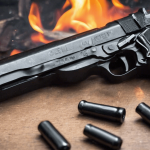Understanding Resilience in British MMA
Resilience in MMA is the ability to persist and perform despite setbacks or adverse situations. In the context of combat sports, fighters need to bounce back emotionally and mentally from losses or tough matches. This often involves channeling their inner strength to cope with stress, a crucial component for any successful fighter.
Mental toughness plays a pivotal role in this resilience. It is the psychological edge that allows fighters to maintain focus and motivation, even under pressure. This attribute is not just inherent but can be developed through rigorous training and psychological strategies. Fighters work on advancing their mental toughness through preparation and sustained efforts, allowing them to regroup and push through challenging situations.
This might interest you : Premier Nutrition Blueprint for UK Sumo Wrestlers: Boosting Training Performance with Savvy Dietary Decisions
An essential component of resilience is psychological recovery. Fighters employ various methods, such as visualization, positive self-talk, and meditation, to recover mentally. These techniques help alleviate stress, rebuild self-confidence, and prepare mentally for future competitions. Visualization involves mentally rehearsing scenarios which enhance focus and clarity. Meanwhile, positive self-talk assists fighters in reinforcing a winning mentality by combating self-doubt. Ultimately, these elements collectively contribute to a strong psychological framework, empowering fighters to rise above adversities effectively.
Personal Anecdotes from Fighters
In British MMA, personal anecdotes reveal the profound impact of defeat on fighters. Exploring overcoming adversity, these stories offer invaluable insights into the resilience required at the highest levels of the sport. Interviews with established British fighters frequently underscore the crucial role of early setbacks in building mental toughness. For example, one prominent fighter shared how early losses fostered a relentless drive to enhance skill development. This involved re-evaluating training strategies and embracing feedback from technical flaws observed in previous bouts.
In the same genre : Premier Nutrition Blueprint for UK Sumo Wrestlers: Boosting Training Performance with Savvy Dietary Decisions
Interviews with British MMA Fighters
Fighters often emphasize that recovery is not just about physical training. British MMA athletes recount experiences where psychological techniques like visualization played a vital role in their comeback. These personal stories highlight the power of mental preparation, especially when the pressure is intense.
Analyzing Common Themes
Common themes emerge from these narratives, such as the importance of a robust support system. Mentorship and team dynamics frequently surface as key factors that aid in crisis recovery, reinforcing mental resilience. Notably, sharing stories of overcoming past challenges often inspires and empowers fellow fighters and fans alike, fostering a culture of support and encouragement within the British MMA community.
Psychological Techniques for Recovery
Mental recovery plays a pivotal role in a fighter’s journey post-defeat, with various mental techniques offering paths to regain focus and confidence.
Visualization Practices Among Fighters
Fighters commonly use visualization to mentally rehearse their fights, developing a clear vision of success. This technique not only enhances performance strategy but also fosters emotional resilience by alleviating pre-fight anxiety. It builds a sense of familiarity with the scenarios, promoting calmness and precision under pressure.
The Role of Positive Self-Talk in Rebuilding Confidence
Positive self-talk is a key strategy in counteracting self-doubt and maintaining a winning mindset. By affirming positive beliefs, fighters boost their confidence and reinforce their capacity to overcome challenges. This proactive dialogue helps reduce negative stress responses and encourages perseverance in high-pressure situations.
Meditation and Mindfulness Techniques in Training
Engaging in meditation and mindfulness practices can significantly enhance an athlete’s focus. These methods work by centering the mind, reducing stress, and managing emotions effectively, enabling fighters to maintain mental clarity before and after combats. Real-life accounts from successful fighters highlight these practices as integral components of their psychological recovery and overall resilience.
Training Adjustments Following Defeat
After experiencing a defeat, British MMA fighters often re-evaluate their training strategies. This reassessment is crucial for skill development and tailoring training regimens to address specific weaknesses. Understanding where improvements are needed allows fighters to focus on strengthening those areas and enhances overall performance.
Fighters incorporate feedback from their losses into their daily routines by analysing past bouts to identify technical flaws. They then adjust their training to correct these issues, integrating new techniques and honing their skills. This creates a continuous improvement cycle, fostering resilience.
Physical conditioning is equally critical. A robust physical training program is essential to ensure peak performance. Fighters work on enhancing endurance, strength, and agility, essential elements in their path to bounce back stronger. This comprehensive approach not only boosts physical readiness but also contributes to mental grit by instilling confidence that they are well-prepared for future challenges.
The combined focus on apt training adjustments, meticulous feedback integration, and heightened physical preparedness creates a resilient mindset. These adjustments lay the foundation for fighters to evolve post-defeat, equipping them to handle future competitions with enhanced mental toughness and physical prowess.
The Role of Coaches and Support Systems
In the competitive landscape of British MMA, coaching support and mentorship play indispensable roles in a fighter’s psychological resilience. Coaches are pivotal in helping fighters cultivate mental toughness. They offer tailored strategies that address unique challenges fighters face, underscoring the significance of adapting coaching styles to each individual’s needs. Strong mentorship provides fighters with the motivation and guidance necessary to overcome adversities.
Beyond personal mentoring, team dynamics within training environments foster an atmosphere of collective growth and resilience. Supportive teammates help fighters remain focused and mentally prepared, particularly in moments of self-doubt. They’re often involved in practices and recovery strategies, creating a cohesive unit that inspires confidence and determination.
To build a robust support network, fighters often rely on seasoned coaching staff who encourage them to face challenges head-on. By integrating structured feedback and constant encouragement, coaches ensure fighters continually aim higher, regardless of past setbacks. This communal effort aids fighters in nurturing resilience, both mentally and emotionally, equipping them to withstand the pressures of high-level competition.
Ultimately, the strength of these support systems markedly influences a fighter’s capacity for psychological recovery and ongoing success in the demanding world of MMA.
Implications on Mental Health and Performance
Resilience in MMA not only impacts physical performance but also mental health. Fighters who master stress management often perform better, as mental clarity is essential in high-pressure situations. Performance psychology focuses on strategies like visualization and mindfulness, which help fighters maintain focus and control under stress. Effective stress management is essential; it mitigates anxiety, reduces injury risk, and enhances precision in combat.
The Impact of Mental Health on Athletic Performance
In MMA, poor mental health can lead to inconsistent performances. Stress and anxiety can impair decision-making and reaction times, both critical in combat sports. However, positive psychological practices strengthen overall performance, by promoting mental clarity and resilience.
Stress Management Techniques for Fighters
The intensity of MMA demands robust stress management methods. Techniques such as breathing exercises, meditation, and positive self-talk empower fighters to manage emotions. Long-term resilience not only bolsters performance but also safeguards mental health. Fighters who incorporate these practices often report improved focus and confidence, essential for sustaining their careers.
Resilience is more than bouncing back; it’s about thriving despite challenges, allowing fighters to enhance both their mental well-being and professional success in the demanding world of MMA.


